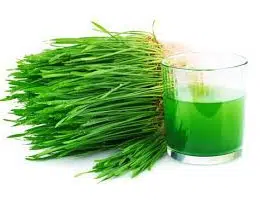 The term chlorophyll derives from the French chlorophylle , although its etymological roots are found in two words of the Greek language : chlōrós (which refers to the yellowish green color) and phýllon (translatable as "leaf" ). The etymology of chlorophyll, therefore, tells us about yellowish green leaves .
The term chlorophyll derives from the French chlorophylle , although its etymological roots are found in two words of the Greek language : chlōrós (which refers to the yellowish green color) and phýllon (translatable as "leaf" ). The etymology of chlorophyll, therefore, tells us about yellowish green leaves .
Chlorophyll, specifically, is a pigment that can be found in green plants and in some bacteria and algae . It is an essential biomolecule for the development of photosynthesis , which is the process carried out by certain organisms to convert sunlight into energy.
The discovery of chlorophyll took place in 1817, when French scientists Joseph Bienaimé Caventou and Pierre-Joseph Pelletier managed to isolate the pigment . Pelletier , in fact, resorted to the use of solvents to isolate for the first time other substances such as quinine and caffeine .
Chlorophyll is located in the organelles known as plastids of the eukaryotic cells of plants and algae and in the membranes of the sacs called thylakoids , present in bacteria and other organisms. Each chlorophyll molecule has a phytol chain (which allows the chlorophyll to remain integrated into the photosynthetic membrane) and a porphyrin ring (which develops light absorption).
The green color of chlorophyll is due to the fact that it reflects the part of the visible spectrum of light that corresponds to that shade. The pigment also transfers this color to the tissues and organisms that contain it.
Like many other products of nature, chlorophyll has proven to be very beneficial for our health . It is important to note that the medicine does not directly endorse the properties that we will present below, but rather these are based on the experience of those who have tried it and recommend it.
One of the names that chlorophyll receives in everyday speech is " the blood of plants ", particularly because it has a molecular structure similar to that of our blood; The difference between the two is that the first is composed mostly of magnesium, while the second is composed mostly of iron.
Defenders of chlorophyll claim that it is a " miraculous substance ", and base their claim on the results of various scientific studies according to which it helps us maintain health by promoting the good condition and functioning of our organs.
 First of all, we can say that its consumption serves to detoxify and oxygenate the body , acting directly on the blood to increase its production. A greater volume of new blood means that oxygen is moved more efficiently to the cells, which directly benefits the health of the most important organs.
First of all, we can say that its consumption serves to detoxify and oxygenate the body , acting directly on the blood to increase its production. A greater volume of new blood means that oxygen is moved more efficiently to the cells, which directly benefits the health of the most important organs.
Chlorophyll can help prevent the negative effects of radiation , and also eliminate heavy metals and other waste from our body . This detoxifying effect is complemented by its cleansing action in the colon, thanks to which the presence of bacterial flora in the intestine increases and the chances of cancer are reduced.
On the other hand, it is also possible to keep the immune system strong through regular consumption of chlorophyll, since a large number of bacteria and viruses cannot proliferate in oxygen and chlorophyll participates in the oxygenation of the body.
Digestive problems are among the most common, and chlorophyll also has a solution in this context. It not only protects the integrity of the colon, but also promotes the proper functioning of the gallbladder, stomach and liver , and collaborates in the decomposition of stones to promote the elimination of excessive acid.
